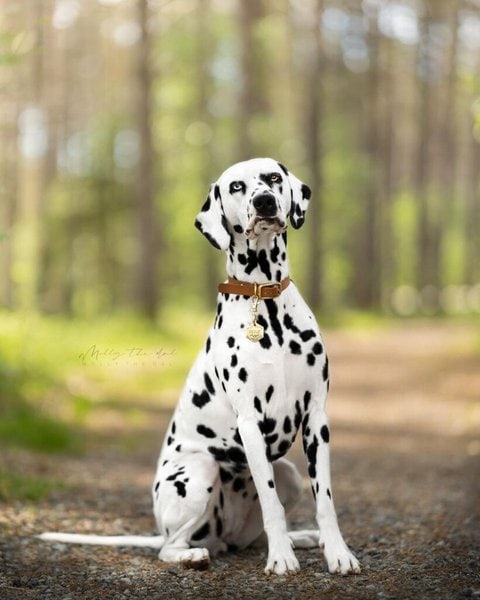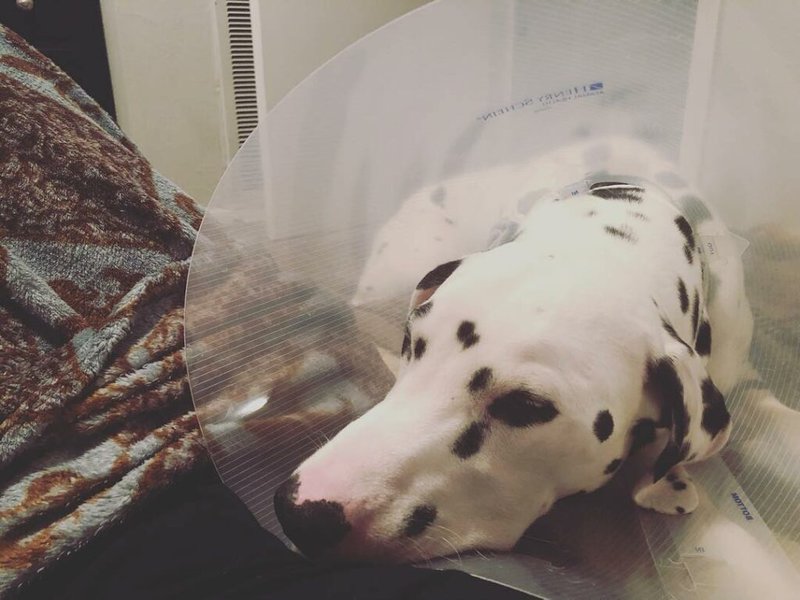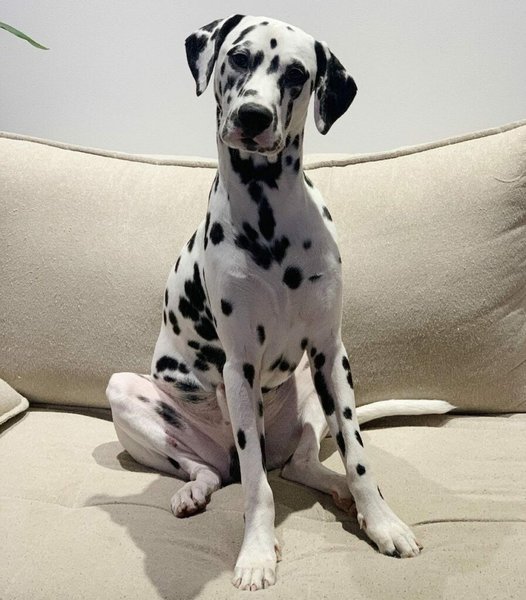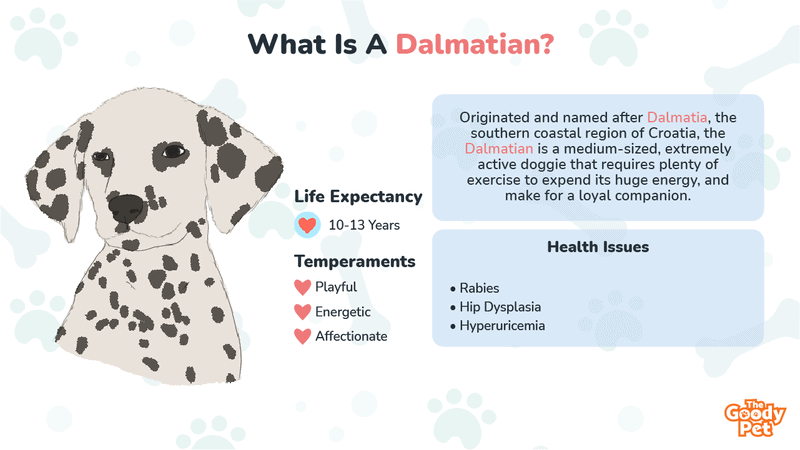I didn’t know that Dalmatian puppies are born without spots until I read up on the doggie’s genetics. And this complete breed guide will help answer any other pressing questions about the Dalmatian dogs, the very same dog breed popularised by Disney’s animation classic, 101 Dalmatians. So, what should you know about this dog breed?
Originated and named after Dalmatia, the southern coastal region of Croatia, the Dalmatian is a medium-sized, extremely active doggie that requires plenty of exercise to expend its huge energy, and make for a loyal companion. It is also good to know that your doggie will develop separation anxiety if left alone, sheds a lot, and requires plenty of room for exercise.
Dalmatians are fondly called the Firehouse Dog, Spotted Coach Dog among others, and exhibit rare levels of versatility. This is why the Dalmatian dogs serve more specialist functions than any other dog breed. In this article, we discuss grooming and maintaining your canine, appropriate tools to use, and assessing whether your doggie is good for the family. Continue reading to find out the required care practices, recommended diet, and expected lifespan. Before that, let’s look at why Dalmatians are hard to find.
Why Are Dalmatians So Rare?
Dalmatians are not necessarily a rare breed, despite ranking at 51st of 195 on AKC’s popular breed index. Also, you won’t see these Firehouse doggies as often lately, with the breed being notoriously hard to find and get.
So, why don’t you see a lot of Dalmatians? This is because only a handful breeders are able to successfully bred these Dalmatian dogs and most dog owners are unable to provide the right level of care for them.
These canines need a lot more space for exercise, shed more than most breeds, and are often afflicted by more congenital health conditions. As such, apartment-dwellers and first-time owners are not likely to keep a Dalmatian dog.

How Big Do Dalmatians Get?
Dalmatians are medium-sized dogs. Your adult male pooch grows to about 21 to 23 inches high at withers, and measures between 45 and 60 lbs. Conversely, the adult female Dalmatian grows to between 19 and 22 inches high at withers, while weighing about 45 to 60 lbs.
You will notice your dear fido grow very fast initially before the growth rate declines towards maturity. The canine will reach its full-grown adult size approximately 16 months after birth, weighing between 36 to 50 lbs, and standing at about 18 to 22 inches tall on its shoulders.
Physical Appearance
Dalmatian doggies have a white coat with black or brown spots, which start appearing about 2 weeks after birth, and are unique to each dog in number and pattern. The doggie has a silken but muscular body and a long tail that curves upwards slightly. Dalmatians have a short, dense coat that accounts for their heavy shedding.
How Long Do Dalmatians Live?
Your Dalmatian dog is said to have an average life expectancy of 10 to 13 years.
To be absolutely sure that your puppy is healthy before taking it home, consider performing extensive genetic tests and obtaining a health guarantee from the breeder.
Deafness Prevalence In Dalmatians
Deafness is rampant in Dalmatians because this condition is hereditary with no known cure. In fact, the 2004 study on a sample size of over 5,000 dogs has statistically shown that a Dalmatian has a 5.3% chance of being bilaterally deaf or a 13.1% chance of unilateral deafness.
And statistically speaking, in this population sample size, nearly 18.4% of Dalmatian dogs are likely to be deaf in either one or both ears. As such, breeders often do not breed Dalmatians that are deaf due to heredity, leading to an increased scarcity of this specific dog breed.
By far, the most prevalent health issue in Dalmatian dogs is congenital deafness. We will look at the other issues affecting this dog breed next.

Common Health Issues
Like most purebred dogs, a Dalmatian is plagued by numerous hereditary health issues and may also suffer other non-congenital health issues, including viral and bacterial infections such as rabies, distemper, and parvo. Other health issues can include:
Hyperuricemia
This congenital condition arises from kidney stones and gout forming in your dear fido due to a buildup of uric acid. Minimize the risk of hyperuricemia by serving low-purine food and ensuring your doggie drinks plenty of water to urinate more.
Hip Dysplasia
This is a condition arising from abnormal development of joints, and which affects your Dalmatian’s hips. Mobility issues and arthritis are often a result of hip dysplasia.
Copper Hepatopathy
It is a liver disorder that causes toxic copper buildup in the liver, resulting in fatal liver failure. Affected doggies show symptoms of jaundice at 2 to 4 years old, including yellow eyes, gums, and skin. Treatment involves concurrent copper chelation and restricted copper intake.
How To Take Care Of Your Dalmatian?
The optimum care regime for your canine involves a regular exercise routine, a high-quality diet, a clean living space with a secure playground, and, more importantly, your companionship and time.
These conditions are useful in helping your pooch to expend pent-up energy and preventing it from becoming destructive.
High-Quality Diet
Your Dalmatian dog will thrive on a low-purine diet and plenty of water to minimize kidney stones. We advise, however, that you feed your doggie based on age, size, and health, with complete commercial dog food the most suitable.
For a healthy Dalmatian dog, we found 2 to 3 meals of equal daily rations. Allow at least 2 hours between the final meal and bedtime and 1 hour between meals and exercise to aid digestion.
We highly recommend Pet Plate and its freshly prepared meals made from a high-protein, grain-free beef recipe that is both delicious and nutritious to improve your doggie’s health.
It is essential that your dear fido gets multivitamins to fill any nutritional gaps and make up for under-consumed nutrients. Including cheese, vegetables, and potatoes in the diet will provide vitamins A, C, D, E, and K, but commercial multivitamin packs will work just as well.
Your canine also needs white meat and carbohydrates for energy replenishment, and we recommend serving both in moderation to avoid obesity issues.
Any treats offered alongside training must be considered as part of the day’s rations and should be limited to less than 10% of the calories consumed per day.
We also recommend investing in high-quality dental water additives to complement our care regime. The use of such additives will keep periodontal diseases from happening to your Dalmatian dog.
Exercise Routine
Dalmatians require regular and vigorous exercises due to their high energy. Provide sufficient and secure space for the doggie to romp about freely, such as a high-fence backyard to prevent jumping.
Furthermore, we recommend at least two-hour sessions of guided and interactive exercises every day, such as walks, playtime, and flyball. Adequate exercise also keeps your Dalmatian’s brains active but avoids rigorous activities which can damage growth platelets resulting in stunted growth.
Is A Dalmatian A Good Family Dog? Temperaments Of Dalmatian Dogs
Only when well trained do Dalmatians make good companions for the household. They can get aggressive and become restless if they are left alone for long. Expect your lonely canine to display destructive behaviors, such as incessant digging, chewing, and scratching of surfaces.
Being very protective, your Dalmatian will likely bark, nip, or even snap at strangers. You can minimize this instinctive aggression through proper behavioral training and enhanced socialization exercises.
Temperaments Of Dalmatian Dogs
Dalmatian dogs are considered to be intelligent working dogs, according to Stanley Coren’s ranked list. They are therefore a lot easier to train and can master a number of commands. Coupled with their aggression levels, Dalmatian dogs make reliable guard dogs.
Their energetic and playful nature occasionally makes Dalmatian dogs very stubborn during training, and with poor training, they can become wary and aggressive around strangers. Always keep training sessions short and rewarding with treats to assist these dogs in completing their training.
All in all, the varied Dalmatian temperaments include:
- Intelligent
- Aggressive
- Energetic
- Playful
- Affectionate
- Outgoing
Why Are Dalmatians So Aggressive?
Your Dalmatian dog has natural protective and guarding instincts. This, in turn, leads to aggression towards strangers, such as barking or growling if the doggie senses a threat.
Dalmatians have established themselves in the past as premier coaching dogs protecting carriages and horsemen from various dangers on the road and will stop at nothing to protect their owners.
However, we found that low-protein diets with omega-3 supplements can rein in this aggression through reduced anxiety and lower hyperactivity.
Being affectionate creatures, Dalmatians love to cuddle and spend time with the family. This fondness for people means your doggie thrives on human companionship and will suffer loneliness and separation anxiety if left alone for more than 2 to 3 hours.

Are Dalmatians High-Maintenance? Grooming Tips For Dalmatian Dogs
Your Dalmatian is considered to be a high-maintenance companion. Besides the aforementioned level of care to be provided, this pooch requires vigorous bathing and grooming routines to maintain its beautiful distinctive spotted look.
Grooming Tips For Dalmatian Dogs
Use a high-velocity dryer to loosen dirt on the coat and dander from the skin before bathing. We also recommend that you card your canine’s coat lightly to speed up shedding.
Regular bathing and grooming routines are paramount, with one bath every week and a weekly grooming frequency. However, bathe less active Dalmatians once every fortnight to reduce exposure to allergens.
The short, smooth hair coat means your Dalmatian requires minimal grooming. However, brush weekly to minimize matting and control shedding. We recommend using specialized tools such as the FURminator Undercoat Tool to groom your doggie better.
Do Dalmatians Shed A Lot?
Your Dalmatian has a short but dense coat with minimal shedding around the year. Unlike other dogs, however, your furry companion does not stop shedding, ever, but the shedding incidence decreases with age.
For this reason, the Dalmatian dog is not considered to be hypoallergenic.
You can control the shedding of Dalmatians through regular bathing, brushing, and maintaining a high-quality diet.
So, do Dalmatians like baths? Dalmatians are very clean doggies and readily plunge themselves into the water for a bath. They are also natural swimmers, which helps Dalmatians live odor-free.
Always use high-quality products like the Seamus Cherry Blossom Whitening Dog Shampoo to bathe your pooch. This shampoo comes with a whitening component that helps to brighten the basic white coat the Dalmation dog will have.
Use hydrating sprays after the bath to lock moisture in the skin and coat. Applying circular motions of a grooming mitt will stimulate the release of natural coat oils to protect your pooch from allergens.
Related Questions
How Much Do Dalmatian Puppies Cost? The price of a Dalmatian puppy largely depends on your location and the breeder. On average, you should expect to spend between $1,000 and $2,000 to acquire a Dalmatian puppy. Unlike most dog breeds, Dalmatians are expensive because reputable breeders exercise extra caution to avoid passing genetic disorders during breeding.
Why Is The Dalmatian A Fire Dog? As Dalmatians are already trained to run alongside horsemen, the Fire Department of New York City normally has these dogs running in front of fire carriages, clearing the path toward fires. The doggie’s athleticism and ability as coaching dogs also made training easier than other dog breeds in firefighting in the past.
Do Dalmatians Like Swimming? With its origins in Dalmatia, a coastal region of Croatia, Dalmatians love water, and will often jump into pools to swim and play. In general, therefore, your dear fido is a natural swimmer, though some doggies won’t like water. Even then, water-shy Dalmatians require little training to become adept swimmers, meaning you will have to establish how your dog behaves in water.





